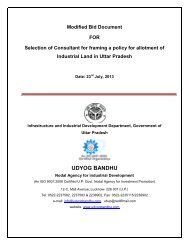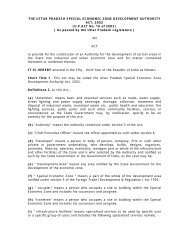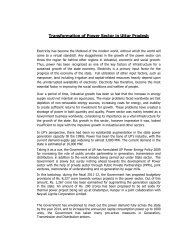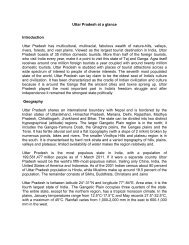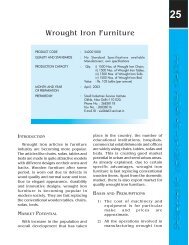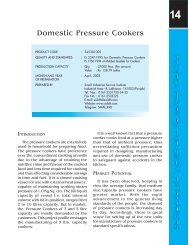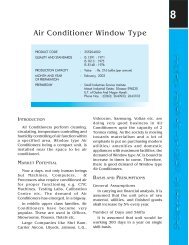PART - III - Udyog Bandhu
PART - III - Udyog Bandhu
PART - III - Udyog Bandhu
You also want an ePaper? Increase the reach of your titles
YUMPU automatically turns print PDFs into web optimized ePapers that Google loves.
Annexure - VIIVALUATION METHODOLOGIES1 Disinvestment Commission's RecommendationsKeeping in view the above problems regarding valuation specific to a PSU, the issue wasdiscussed in detail by the Disinvestment Commission in its First Report. Underlining theimportance of valuation, the Commission felt that the valuation of equity of a firm gainsimportance in case of disinvestment of companies which are not listed or in cases where capitalmarkets may not fully reflect the intrinsic worth of a share disinvested earlier.Disinvestment Commission, in its Discussion Paper while emphasizing that valuation shouldbe independent, transparent and free from bias, has discussed three methods of valuation:(i) The 'Discounted cash flow' (DCF) approach relates the value of an asset to the presentvalue of expected future cash flows of the asset.(ii) The 'Relative valuation' approach is used to estimate the value of an asset by looking at thepricing of comparable assets relative to a common variable like earnings, cash flows, bookvalue or sales.(iii) The 'Net asset value' approach provides another basis for valuation.Regarding the application of Valuation Methods, Disinvestment Commission felt that the useof a particular method of valuation will depend on the health of the company being evaluated,the nature of industry in which it operates and the company's intrinsic strengths. The depth ofcapital markets will also have an impact on the valuation. For example, in the United Kingdom,the London Stock Exchange has helped in creating markets by enabling credible pricediscovery for the shares of privatised companies listed on the exchange. Although valuationmethods will indicate a range of valuations, Disinvestment Commission felt that somediscounts might need to be applied for arriving at the final value depending on the liquidity ofthe stock and the extent of disinvestment:a) ‘Lack of marketability' discount takes into account the degree of marketability (or the lackof it) of the stocks being valued. This is applicable especially to cases, which had beendisinvested earlier and have been referred for disinvestment again. Discount on thisconsideration stems from the fact that an investor will probably pay more for a liquid stockthan for a less liquid one. However, the concern of an overhang of supply may adverselyaffect valuation even for liquid stocks.b) Disinvestment Commission felt that the extent of disinvestment in core, non-strategic &non-core PSUs would have a bearing on the valuation process. The transfer of acontrolling block may help to reduce the discount that has to be applied, as the prospectiveinvestor would be willing to pay a certain 'control premium' towards enhancedmanagement participation, board control and majority shareholder rights.c) If all the businesses of a PSU are not equally profitable, it may be necessary to restructurethe business before disinvestment. However, if this is not possible, a minority discountmay have to be applied.137




